How To Get Rid Of Greasy Face
We know by now that oily skin isn't necessarily the enemy, although sometimes, it can sure feel like it.
A completely matte complexion might not be something to aspire to, but there is satisfaction to be found in balance: after all, your skin needs oil, but an excess of the shiny stuff is less than appealing.
The thing to remember though, is that you can't 'get rid' of oily skin entirely, and nor should you feel compelled to: real, healthy skin doesn't look like an Instagram filter.
But keeping your face on the right side of shiny? That is totally possible. Understanding your oily skin is the key to managing (not eliminating) it, and once harmony is restored, you'll have a happy, healthy complexion that looks glowy, never greasy.
To finally sort fact from fiction, we grilled the experts for some sage advice on keeping oily skin as its healthiest, most resilient state. Here, see everything you need to know, including the reasons your skin feels oilier than usual, and the best treatments to try now...
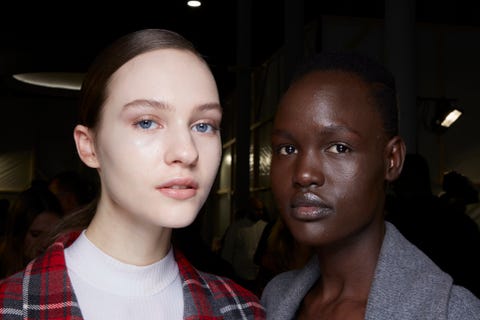
Gregory Scaffidi
What causes oily skin?
'Our skin's oil is called sebum. It's produced by the sebaceous gland in the hair follicle,' explains Andrea Pfeffer, founder of Pfeffer Sal. 'Per cm2, the skin on our face has more hair follicles than on the rest of our body, which is why we experience oiliness mainly on the face.'
This sebum does in fact perform an important function, working to 'lubricate the skin, limit the growth of bacteria and prevent dryness and dehydration,' adds Pfeffer.
When things are in balance, your skin will produce just the right amount of oil to keep it functioning and resilient – but there are many things that can tip the scales, leading to excess oil and pesky breakouts.
So, what's the best route to balanced, hydrated skin? Below, see 8 things to consider now.
8 Ways To Manage Oily Skin

Matteo Scarpellini
1. Master Your Daily Cleansing Routine
When you have oily skin, the urge to wash your face at every available opportunity can be strong. But according to facialist Joanne Evans, your frequent face-washing habit may actually be making things worse.
'It seems logical that removing the skin's oil would be the best way to clear oily skin, but over-cleansing actually activates further oil production,' she says. Simply speaking, when you cleanse so much you remove the skin's natural – and necessary – sebum reserves, it's going to rectify things by producing more.
Pamela Marshall, Clinical Aesthetician and founder of skin clinic Mortar & Milk, says that she tends to see over-cleansing in her younger clients – which makes sense, considering all the alcohol-laden, barrier-stripping cleansers marketed towards hormonal teenage skin. 'Unfortunately, over-cleansing just makes the problem worse,' she confirms. 'The more you deplete the oils from your skin, the more your skin will want to produce oil. Cleansing properly (not over cleansing!) and adding hydration is the key to reducing oil production.'
Clearly, the cleanser you choose is crucial – but between milks and gels, foams and water, it can be near-impossible to decide which one is best for an oil-prone complexion.
Pfeffer recommends a cream or milky cleanser, as these will dissolve dirt and debris without disturbing the barrier function and natural moisture levels of the skin. 'You can also go for a cleanser with BHAs (or salicylic acid) in to really assist in dissolving excess oil,' she suggests.
Marshall agrees, always advising her oily-skinned clients to use 'milky, creamy balmy cleansers.' Equally important is the way you remove said cleanser: 'Always, always remove your cleanser with a clean flannel. There's no splashing in skincare!'
So, don't be fooled by that super-strength, alcohol-steeped cleanser that claims to be formulated for oily skin. Which leads us on to...
2. Be Wary Of Products Formulated For Oily Skin
Believe it or not, products specially formulated for minimising oiliness often exacerbate the situation, as so many contain harsh ingredients that sweep away every last drop of sebum from the skin (and we all know what that means).
'We were taught for so long that stripping the skin of oils is the way to treat it, but actually that's wrong. When the skin is stripped or dried out it goes into oil production overload,' says Marshall.
According to Pfeffer, the main culprits are products containing alcohols, astringents and sulphates, while Marshall adds benzoyl peroxide and daily AHAs into the mix too.
'This means many old-school toners and foaming cleansers are off the table – and for good reason!', she says. 'Whilst they'll have a satisfying short-term effect of removing the excess oil on the surface of the skin, over time the lack of oil in your skin will trigger excess oil production.'
Furthermore, these harsh products can interfere with your acid mantle: the skin's protective barrier. 'A disrupted skin barrier can lead to sensitivity, breakouts, inflammation and dehydration,' warns Pfeffer. So, the verdict is clear: if any products in your routine are making your skin feel dry and tight, give them the boot.
3. Don't Ditch The Moisturiser
A common misconception is that skin can either be oily or dehydrated – but in fact, it can be both at the same time. This means there's little sense in ditching the hydrating products which are, in fact, essential in every skin routine – no matter your skin type.
Hydrating products are necessary to maintain moisture levels and prevent dehydration. But before you reach for the first face cream within your grasp, consider that your choice of product is an important one. If you're worried about blackheads and blemishes as well as that dreaded shine, it's best to avoid those that are super-creamy, heavy and occlusive. 'Your skin probably won't appreciate thick heavy moisturisers, so avoid any creams with rich plant butters as these are likely to be too rich and lead to congestion,' advises Pfeffer.
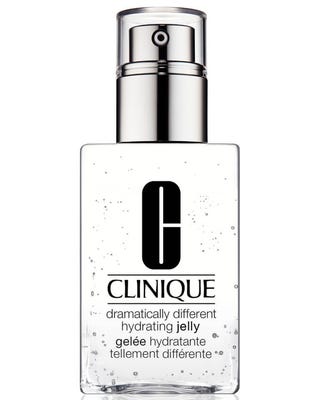
Dramatically Different Hydrating Jelly
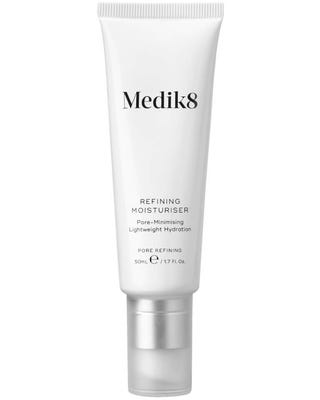

Poreless Oil-Free Moisturiser
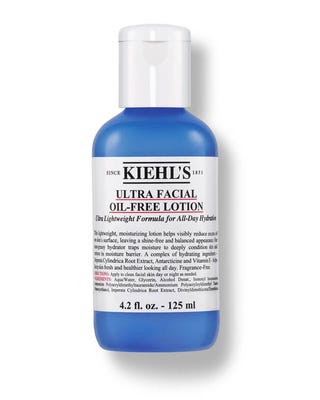
Ultra Facial Oil-Free Lotion
Kiehl's kiehls.co.uk
£29.50
4. Get To Grips With Salicylic
Acids can be beneficial in any regime, but leave-on BHAs like salicylic acid play an especially important role in controlling overzealous oil production, which in turn minimises the development of blackheads and blemishes.
'Salicylic acid is a beta-hydroxy acid which is lipophilic, meaning it is attracted to and helps to break down excess oil,' says Pfeffer. 'As an added bonus, it's anti-inflammatory and can penetrate pores to scoop out any debris, making it a great ingredient for targeting the congestion that often comes with oiliness.'
The best way to incorporate salicylic acid into your routine is with a daily exfoliant, swiped over skin after cleansing. Just don't make the mistake of rinsing it off: it'll be nowhere near as effective at sweeping away any greasiness. If you're using a salicylic acid cleanser instead, leave it on for two minutes before washing (a great opportunity for a little facial massage).

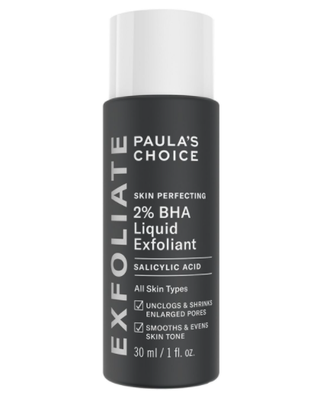
Skin Perfecting 2% BHA Liquid Exfoliant
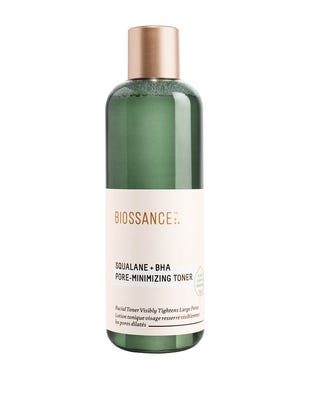
Squalane + BHA Pore Refining Toner
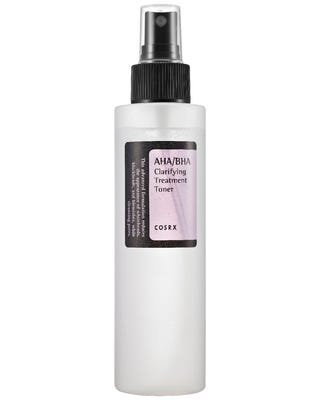
AHA/BHA Clarifying Treatment Toner
5. Address Your Diet
According to Evans, the root of your oily skin issues could actually lie in your gut. 'If you suffer from oily skin, avoid sugar and dairy, as they feed and increase oil production,' she explains.'What's more, a diet deficient in zinc, magnesium, vitamin B and omega 3 may contribute to oil production.'
Pfeffer agrees, recommending in particular that we eat more zinc-rich foods. 'Zinc helps to regulate the oil-producing glands, so they behave better! Great sources include shellfish, legumes and nuts.'
And of course, it's crucial to consider your intake of sugar. 'A high sugar intake can also increase oil production, as insulin creates the hormone IGF-1 which can increase the production of sebum,' explains Pfeffer.
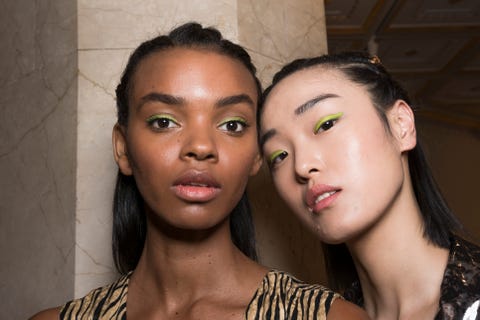
Matteo Valle
6. Consider Your Hormones
Internal hormone fluctuations are one of the main causes of imbalanced oil levels, according to Marshall. 'It's the androgen hormone that is causing the issue,' she says. 'When androgen is in abundance (which it often is right before your period, or if you have PCOS), it will send messages to our sebaceous glands telling them to produce more oil.'
Androgens can also be released in times of stress, or through internal shifts such as the menstrual cycle, contraception, puberty, pregnancy and postnatal, and the menopause. In particular, multiple studies have indicated a positive correlation between stress levels and sebum production in people with acne-prone skin.
Of course, these situations are often out of your control, but you can attempt to maintain balance by paying attention to your sleep habits and stress levels.
7. Indulge In A Clay Mask
Today's beauty shelves might be piled high with increasingly innovative formulas, but sometimes the oldest treatments remain the best.
Pfeffer is keen to remind us of the benefits of a good old clay mask: 'They're fantastic allies when targeting oiliness as they act like sponges, absorbing excess oil,' she explains.
Thankfully, you don't need to spend a fortune on a mud mask, either: simply look for one containing French green or bentonite clay, as these are generally the most absorbent. Kaolin clay is a great all-rounder, too.
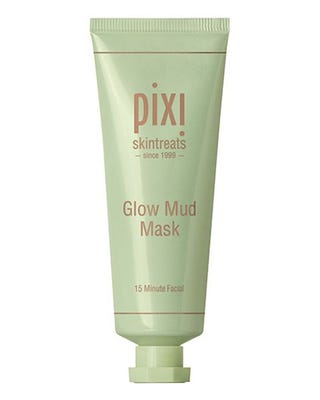
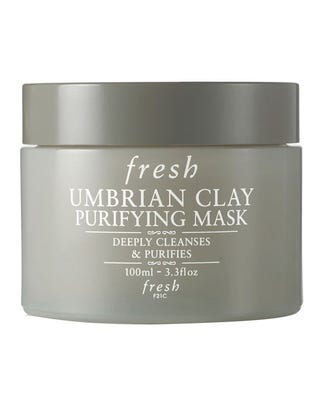
Umbrian Clay Purifying Mask
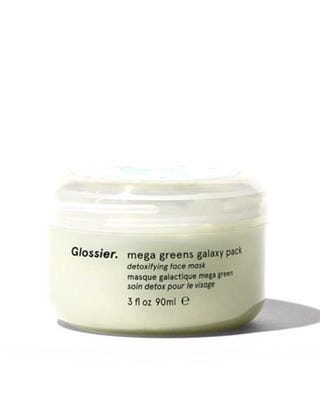

Anti-Blemish Clay Mask
La Roche-Posay Effaclar
£12.00
8. Choose Your Foundation Wisely
When you've got oily skin, don't restrict yourself to long-wear liquid foundations. Mineral powders come with so many benefits: not only are they largely non-comedogenic (meaning they won't clog your pores), they're unrivalled in the oil-absorbing department, and can easily be layered up as the day goes on.
But if you're loyal to a liquid, that's fine too – just invest in a great setting powder to seal the deal.
'The Laura Mercier Translucent Loose Setting Powder is my holy grail powder for oily complexions as it keeps skin shine-free for hours on end,' says make-up artist Gabriella Floyd, who has a pretty clever oil-eliminating technique of her own.
'My top tip is to apply it using a damp Beautyblender,' she says. 'This allows you to really press the powder into your skin so it doesn't budge as the day goes on.'
If you're on the go, it's fine to use a pressed powder to stop your foundation from slipping off, as long as it's super-light. 'To prevent shine throughout the day, pick up something really finely milled like Charlotte Tilbury's Airbrush Flawless Finish,' adds Floyd. 'You can keep topping it up and it never, ever gets cake-y, which is why it's a go-to powder in my kit - for my clients and myself.'
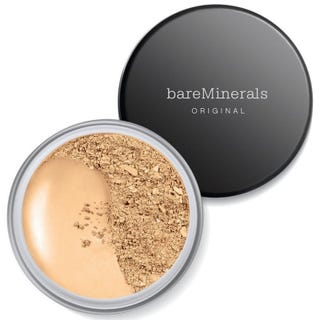
Original Loose Mineral Foundation SPF15

Translucent Loose Setting Powder

Pure Crushed Minerals Powder Foundation
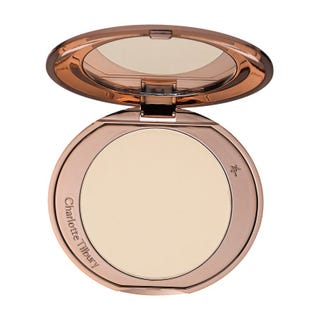
This content is created and maintained by a third party, and imported onto this page to help users provide their email addresses. You may be able to find more information about this and similar content at piano.io
How To Get Rid Of Greasy Face
Source: https://www.elle.com/uk/beauty/skin/a37721/how-to-get-rid-oily-skin/
Posted by: cartercastand.blogspot.com

0 Response to "How To Get Rid Of Greasy Face"
Post a Comment